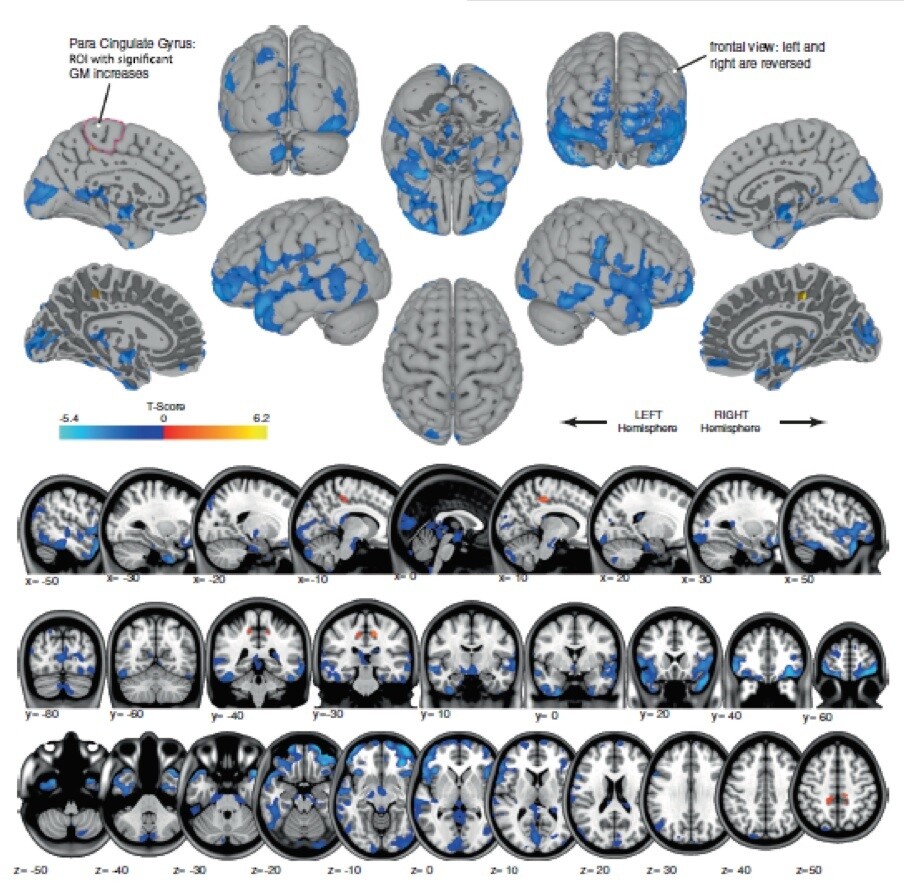Before we start sending humans to Mars en masse, it's probably a good idea to investigate the health effects that long-duration spaceflight can have on the human body. A new study has found that space travel can change the volume of gray matter in different parts of the brain, which may be a result of fluids shifting due to a lack of gravity, and the brain working overtime to relearn the basics of movement in a strange new environment.
Humans evolved to thrive in conditions here on Earth, so it's not surprising that once taken beyond our home turf, we're subjected to a range of health issues. Without gravity constantly pushing down on the body, bones and muscles can lose mass over time, an issue that astronauts on the International Space Station (ISS) try to mitigate through rigorous exercise regimes. Cosmic radiation can also be a serious hazard once we leave the protection of the Earth's electromagnetic field, and early results from an ongoing NASA study has found that long stays in space can actually alter a person's DNA.
This new study, conducted by researchers at the University of Michigan, focused on the brain. The team took MRI scans of 26 astronauts – 12 of which stayed just two weeks as shuttle crew members, while the other 14 lived on the ISS for six months. In all cases, the volume of gray matter increased and decreased in different parts of the brain, and the longer the astronauts spent in space, the more dramatic those changes were.

"We found large regions of gray matter volume decreases, which could be related to redistribution of cerebrospinal fluid in space," says Rachael Seidler, principal investigator on the study. "Gravity is not available to pull fluids down in the body, resulting in so-called puffy face in space. This may result in a shift of brain position or compression."
Fluid displacement due to a lack of gravity has been known to cause all sorts of health issues for space travellers, most notably blurry vision. But on the plus side, one of the most marked increases in gray matter occurred in the parts of the brain responsible for controlling and sensing the legs. This, the researchers propose, could be due to the fact that moving in zero gravity is a completely different experience to getting around on Earth, meaning the astronauts are essentially learning to walk all over again.
"In space, it's an extreme example of neuroplasticity in the brain because you're in a microgravity environment 24 hours a day," says Seidler. "The behavior may return to normal, but the way the brain controls the behavior may change."
The researchers aren't sure exactly what's going on in the brain when the changes occur, but it may be the result of neurons creating new connections. A follow-up study will examine what effects these changes may have on a person's cognition and brain function, as well as how long these changes may last after returning to Earth.
The results seem to line up with another study Seidler conducted, which looked at how the brain responded to spending a long time in an unusual position – in this case, having volunteers lay down for three months, to study the effects of being bed-ridden on the brain. The study found that the brains of the patients shifted upwards.
The research was published in the journal Nature Microgravity.
Source: University of Michigan






